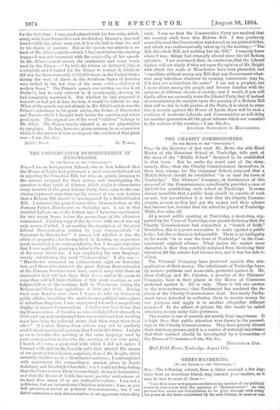THE CHARITY COMMISSIONERS.
[To THE EDITOR OF THE " SPECTATOR."] SIR,—In the Spectator of last week Mr. Rowe, the able Head Master of the Grammar School at Tunbridge, tells part of the story of the " Middle School " designed to be established in that town. But he omits the worst part of the story,. namely, this,—that the Charity Commissioners themselves, in their first scheme for the Grammar School, proposed that a Middle School should be established " in or near the town of Tunbridge." The Skinners' Company, in furtherance of this proposal of the Commissioners, munificently provided a sum of £0,000 for establishing such school at Tunbridge. It seems almost incredible that a public body should be capable of such an act; but nevertheless it is true that the Charity Commis- sioners, as soon as they had got the money and their scheme had become law, insisted that the school be placed at Tunbridge Wells, five miles off.
At a recent public meeting at Tunbridge, a resolution, sup- ported by the Vicar of Tunbridge, was passed declaring that the Charity Commissioners had committed a "breach of faith." Doubtless, this is a grave accusation to make against a public body ; but the evidence is indisputable. There is no ambiguity in the words "in or near the town of Tunbridge" in the Com- missioners' original scheme. What makes the matter more shameful, is that they carefully refrained from disclosing their- intention till the scheme had become law, and it was too late to object.
The Skinners' Company have protested against this mis- application of their money. The inhabitants of Tunbridge have, by various petitions and memorials, protested against it. Mr. Jesse Collings and Mr. Causton, a member of the Skinners' Company, have in their places in the House of Commons protested against it. All in vain. There is but one answer to the remonstrances,—that Parliament has rendered the de- cision of the Charity Commissioners final. But surely Parlia- ment never intended to authorise them to receive money for one purpose, and apply it to another altogether different purpose P In the affairs of private life this would be called obtaining money under false pretences.
The matter is one of general, not merely local importance. It is high titre that public attention were drawn to the proceed- ings of the Charity Commissioners. They have grossly abused their statutory powers, and it is a matter of national importance that their conduct should be investigated by a Committee of the House of Commons.—I am, Sir, &c.,


































 Previous page
Previous page